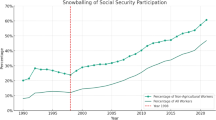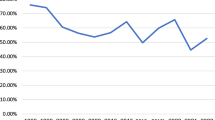Abstract
This article explores the changing politics of economic inequality in Germany in a time of economic austerity and high unemployment and how these changes have affected the electoral fortunes of parties on the German Left. While the SPD experienced a precipitous drop in its electoral support in the most recent federal elections, Die Linke (or the ‘Left’ Party) has emerged as a viable electoral force on the far Left. Though support for the PDS, Die Linke's predecessor, was almost exclusively confined to the Länder of the former DDR, Die Linke has seen its vote share increase in parts of Germany that were traditionally strongholds of the SPD. We analyze constituency-level election results from the 2005 and 2009 federal elections, examining the factors associated with the increase in support for Die Linke. We find that the party's vote share increased the most in constituencies suffering from economic decline, as well as in areas that were previously strongly supportive of the SPD. In the conclusion, we discuss the implications of these findings for the future of the German Left and for parties of the far Left in other advanced industrial countries.


Similar content being viewed by others
Notes
For a detailed discussion, see Vail (2009).
Data from Luxembourg Income Study (LIS) Key Figures, accessed at http://www.lisproject.org/keyfigures.htm on 17 January 2008.
For a more detailed discussion of the post-war German Social Market Economy and its relationship to income distribution, see Bowyer and Vail (2011).
In 1963, total expenditures were a mere DM 1.86 billion. By 1973, this figure had more than quintupled to DM 5.66 billion, and, by 1983, total outlays had risen to DM 17.6 billion. By 1998, total Sozialhilfe expenditures, including those in the new Eastern Länder, were DM 45 billion (DM 39.4 billion in former West Germany) (Breuer and Engels, 1999, p. 18).
In 1999, the basic standard rate ranged from a low of DM 522 (€266.89) per month in Thüringen and Mecklenburg-Vorpommern to a high of DM 548 (€280.19) per month in Hessen and Baden-Württemberg. If we define 1995 price levels as 100, the index of the real value of the standard rate shrank from 102.9 in 1992 to 102.7 in 1997 (Breuer and Engels, 1999, pp. 4, 22).
This independent commission was created in 2002 and led by Peter Hartz, an influential German business leader and Schröder's former colleague at Volkswagen.
For a discussion of the fiscal drivers and implications of the Hartz IV reform, see Hassel and Schiller (2010).
Between 2002 and 2005, the SPD's share among working-class voters in western Germany shrank from 43 to 41 per cent and, in eastern Germany, declined sharply from 41 to 26 per cent. At the same time, the Linkspartei's share of the working-class vote in 2005 was 8 per cent in the west (compared to 2 per cent for the PDS in 2002), and 28 per cent in the east (compared to 12 per cent for the PDS in 2002). Defections from the SPD to the Linkspartei were even more dramatic among the unemployed (Nachtwey and Spier, 2007, pp. 22, 30).
The electoral data were downloaded on 12 February 2010 from the Federal Returning Officer's website: http://www.bundeswahlleiter.de/de/bundestagswahlen/BTW_BUND_09/veroeffentlichungen/index.html.
The structural data were downloaded on 12 February 2010 from the Federal Returning Officer's website: http://www.bundeswahlleiter.de/de/bundestagswahlen/BTW_BUND_09/strukturdaten/StruktBtwkr2009.csv.
All constituencies in Berlin are coded as being located in the Old Federal States.
Three Länder (Saarland, Sachsen and Thüringen) held elections in August 2009, 4 weeks before the federal elections. These states were coded according to their government composition before the August elections. At that time, the SPD took part in the governing coalitions in eight Länder: Berlin, Brandenburg, Bremen, Mecklenburg-Vorpommern, Rheinland-Pfalz, Sachsen, Sachsen-Anhalt and Schleswig-Holstein.
We are indebted to an anonymous reviewer for Comparative European Politics, for this insight.
References
Allen, C. (2009) ‘Empty nets’: Social democracy and the ‘catch-all party thesis’ in Germany and Sweden. Party Politics 15 (5): 635–653.
Bowyer, B.T . and Vail, M.I. (2011) Economic insecurity, the social market economy, and support for the German left. West European Politics, 34 (4): 683–705.
Breuer, W. and Engels, D. (1999) Basic Information and Data on Social Assistance in Germany. Cologne, Germany: ISG Sozialforschung und Gesellschaftspolitik.
Bundesanstalt für Arbeit. (2003) 2002 Annual Report. Nürnberg: BA.
Doerschler, P. and Banaszak, L.A. (2007) Voter support for the German PDS over time: Dissatisfaction, ideology, losers and east identity. Electoral Studies 26: 359–370.
Elo, K. (2008) The left party and the long-term developments of the German party system. German Politics and Society 26 (3): 50–69.
Hartz Commission. (2002) Moderne Dienstleistungen am Arbeitsmarkt: Vorschläge der Kommission zum Abbau der Arbeitslosigkeit und zur Umstrukturierung der Bundesanstalt für Arbeit. Berlin: Hartz Commission.
Hassel, A. and Schiller, C. (2010) Sozialpolitik im Finanzföderalismus: Hartz IV als Antwort auf die Krise der Kommunalfinanzen. Politische Vierteljahresschrift 51: 95–117.
Hough, D. (2001) The Fall and Rise of the PDS in Eastern Germany. Birmingham, UK: University of Birmingham Press.
Hough, D. and Koß, M. (2009) Populism personified or reinvigorated reformers? The German Left Party in 2009 and beyond. German Politics and Society 27 (2): 76–91.
Inglehart, R. (1990) Culture Shift in Advanced Industrial Society. Princeton, NJ: Princeton University Press.
Katzenstein, P.J. (1987) Policy and Politics in West Germany: The Growth of a Semisovereign State. Philadelphia, PA: Temple University Press.
Kitschelt, H. (1990) Beyond the European Left: Ideology and Political Action in the Belgian Ecology Parties. Durham, NC: Duke University Press.
Kitschelt, H. (1994) The Transformation of European Social Democracy. Cambridge: Cambridge University Press.
Knutsen, O. (2006) Class Voting in Western Europe: A Comparative Longitudinal Study. New York: Lexington Books.
Mangen, S. (1996) German welfare and social citizenship. In: G.R. Smith, W.E. Paterson and S. Padgett (eds.) Developments in German Politics 2. Durham, NC: Duke University Press.
Nachtwey, O. and Spier, T. (2007) Günstige Gelegenheit? Die sozialen und politischen Entstehungshintergründe der Linkspartei. In: T. Spier, F. Butzlaff, M. Micus and F. Walter (eds.) Die Linkspartei: Zeitgemäße Idee oder Bündnis ohne Zukunft? Wiesbaden, Germany: Verlag für Sozialwissenschaften.
OECD. (2006) OECD Employment Outlook: Boosting Incomes and Jobs. Paris: OECD.
Olsen, J. (2007) The merger of the PDS and WASG: From Eastern German regional party to national radical left party? German Politics 16 (2): 205–221.
Palier, B. and Thelen, K. (2010) Institutionalizing dualism: Complementarities and change in France and Germany. Politics and Society 38 (1): 119–148.
Paterson, W. and Sloam, J. (2006) Is the left alright? The SPD and the renewal of European social democracy. German Politics 15 (3): 233–248.
Polk, J.T ., Karreth, J. and Allen, C.S. (2010) Catch-all or catch and release? The electoral consequences of social democratic parties’ march to the middle in Western Europe. Paper presented at the American Political Science Association's annual meeting, 2–5 September, Washington DC.
Scharpf, F.W. and Schmidt, V.A. (eds.) (2000) Statistical appendix. Welfare and Work in the Open Economy: From Vulnerability to Competitiveness. Oxford: Oxford University Press.
Shonfield, A. (1965) Modern Capitalism: The Changing Balance of Public and Private Power. Oxford: Oxford University Press.
Streeck, W. (2005) Industrial relations: From state weakness as strength to state weakness as weakness: Welfare corporatism and the private use of the public interest. In: S. Green and W.E. Paterson (eds.) Governance in Contemporary Germany: The Semisovereign State Revisited. Cambridge: Cambridge University Press.
Thelen, K. (1991) Union of Parts: Labor Politics in Postwar Germany. Ithaca, NY: Cornell University Press.
Vail, M.I. (2009) Left of Eden: The changing politics of economic inequality in contemporary Germany. German Politics 18 (4): 559–576.
Vail, M.I. (2010) Recasting Welfare Capitalism: Economic Adjustment in Contemporary France and Germany. Philadelphia, PA: Temple University Press.
Author information
Authors and Affiliations
Corresponding author
Rights and permissions
About this article
Cite this article
Vail, M., Bowyer, B. Poverty and partisanship: Social and economic sources of support for the far Left in contemporary Germany. Comp Eur Polit 10, 505–524 (2012). https://doi.org/10.1057/cep.2011.22
Published:
Issue Date:
DOI: https://doi.org/10.1057/cep.2011.22




